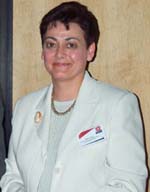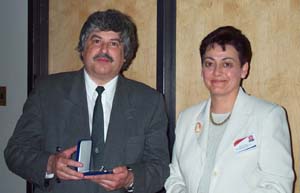

I did my Honours Physics bachelor's degree at the University of Ottawa. After spending three summers studying pulse radiolysis of biological molecules bombarded with a linear accelerator, I had developed an interest for multidisciplinary research. This was not very popular back then and I was told that I had almost jeopardised my chances of getting the NSERC Centennial scholarship by admitting to this fascination during the scholarship interview! I set out to choose a graduate program and selected the University of Toronto since Robin Armstrong was a young, dynamic professor with a large group of students working on Nuclear Magnetic and Quadrupole Resonance of solids and gases. These years spent at obtaining Master's and Ph.D. degrees were truly enriching both from the point of view of acquisition of scientific skills and the friendship and support of fellow graduate students.

For a post-doctoral position I was fortunate enough to go to the IBM Zurich Research Laboratory. There, I got to work alongside Alex Muller who would later win the Nobel prize for high Tc superconductivity and the famous Binnig and Rohrer team who were already famous, and soon to be crowned with the Nobel prize for their development of the scanning tunneling microscope.

After a year at IBM, I was hired as a Research Associate (RA) in the Division of Physics at the National Research Council of Canada in Ottawa. The job interview was conducted in a Zurich pub and included a short transatlantic telephone conversation. I was hired to set up a laboratory to study the newly discovered Quantum Hall Effect and the physics of semiconductor quantum structures. It was exciting to find myself at the forefront of a new field in solid state physics. This first job was a challenge from the point of view of learning about experimental techniques at cryogenic temperatures and high magnetic fields and different class of materials and structures altogether.

My RA position became a continuing Research Officer position at NRC and my career has progressed within this same organization. After 14 years of working at the forefront of nanoelectronics, I took on the challenge of developing a research thrust within our Institute on Organic Materials as emerging materials for photonics and electronics. This is now a very hot field and it is fascinating to participate in the development of tomorrow's materials and applications.

Over my research career the headiest moments were these privileged moments of discovery when Nature reveals some of its secrets and you realize that you are the first to observe these and recognize their significance.

In becoming an Adjunct Professor at the University of Ottawa, I have benefited from contact with graduate students who do their research work in my lab at NRC. This experience has also allowed me to develop research grant application skills! Some of the skills which are useful to anyone entering the workplace be it in science or else where, are people's skills conflict resolution and organizational skills as in time and project management. I have also put these skills to the test in serving as President of the Canadian Association of Physicists.

If your aim is to do research at NRC, then it is essential to obtain a Ph.D. With a Master's or a Bachelor's degree, you can enter NRC as a Technical Officer with a well-defined job description in support of research activities.

I regretted not having chosen the low temperature physics course as an undergraduate elective course and not paying more attention to discussion of transport properties of solids! I should also have taken the machine shop course at U of T but the head technician did not want female students in that class!
